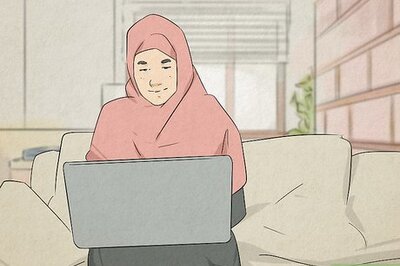
views
Washington: The United States on Tuesday appeared to open the door to eventually arming the Syrian Opposition, saying if a political solution to the crisis were impossible it might have to consider other options.
The comments by a State Department spokeswoman marked a shift in emphasis by Washington, which thus far has stressed its policy of not arming the opposition and has said little about alternatives.
US Secretary of State Hillary Clinton will meet with representatives of some 70 countries in Tunis on Friday for the first "Friends of Syria" meeting to coordinate the international community's next steps to respond the nearly year-long uprising against Syrian President Bashar al-Assad.
Asked if the United States might alter its stance on aiding the Syrian opposition militarily, State Department spokeswoman Victoria Nuland said Washington still believed a political solution "is the best way to go."
"If Assad will heed the view of the international community or respond to the pressure that we are bringing to bear ... we still have a chance for a political solution," she told reporters.
"We don't believe that it makes sense to contribute now to the further militarization of Syria. What we don't want to see is the spiral of violence increase," she said.
"That said ... if we can't get Assad to yield to the pressure that we are all bringing to bear, we may have to consider additional measures."
She declined to elaborate on what those measures might be.
INCREASING PRESSURE
Syrian government forces killed more than 60 people on Tuesday in assaults on villages and an artillery barrage on the restive city of Homs, activists said. The Red Cross called for daily ceasefires to allow in urgently needed aid.
The United States and its allies hope this week's Tunis meeting will allow them to begin drawing up a game plan for Syria after Russia and China vetoed a Western-backed Arab League peace plan at the UN Security Council.
US officials suggest the meeting will focus on ways to increase economic pressure on Assad through additional sanctions and to ramp up humanitarian relief for victims of the repression.
But Arab diplomats have suggested that formal or informal moves to arm the rebels may also be discussed.
Some US politicians like Republican Senator John McCain also support efforts to arm the Syrian rebels - if not directly by the United States, then by other countries or third parties.
"There are ways to get weapons to people who are fighting against this kind of oppression, we showed that in Libya," McCain told reporters on a visit to Jerusalem.
"To somehow sit by and watch this massacre continue without exploring and employing every option that we possibly can to stop it is a betrayal of everything the United States stands for and believes in."
With both Russia and Iran firmly backing Assad's government, political analysts say tacit US support for arming rebel fighters could be risky given Syria's complex ethnic and religious makeup and strategically important position.
"Force employed by the Friends of Syria should be the last step of an escalatory ladder," Robert Danin, a Middle East expert at the Council on Foreign Relations, wrote in an opinion piece on Tuesday.
"Arming the Free Syrian Army and other opposition groups may eventually help topple Assad, but it also increases the potential for a fractured or failed state."



















Comments
0 comment